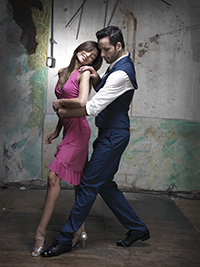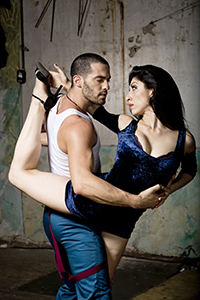Argentinian tango takes center stage at Toronto’s Panasonic Theatre in Arrabal
 Buenos Aires. From the shantytowns in 1979 to the underground tango clubs 18 years later. Following the life of an innocent teenage girl getting lured into the scintillating world of tango in the face of a cultural revolution. Wait, you had me at the tango club. When I first learned of Mirvish‘s latest dance-oriented production, Arrabal, playing at the Panasonic Theatre, images of the Tango Roxanne from Moulin Rouge swam through my head. Yes, sign me up.
Buenos Aires. From the shantytowns in 1979 to the underground tango clubs 18 years later. Following the life of an innocent teenage girl getting lured into the scintillating world of tango in the face of a cultural revolution. Wait, you had me at the tango club. When I first learned of Mirvish‘s latest dance-oriented production, Arrabal, playing at the Panasonic Theatre, images of the Tango Roxanne from Moulin Rouge swam through my head. Yes, sign me up.
Arrabal is a story told entirely through dance, namely the tango, and does so in fun and exciting ways that I normally didn’t attribute the tango to do. Being as that there isn’t any dialogue between performers, the plot is fairly easy to follow — it’s not abstract or arcane, but the choreography speaks volumes.
Beginning first in 1979, a few years after a junta lead by General Jorge Rafael Videla overthrew the democratic government and began a brutal military rule, Rodolfo (Julio Zurita) kisses his baby daughter and mother goodbye before running off to join the mass protest against Videla. It isn’t long before he is caught by Videla’s men, tortured and ultimately executed becoming one of the 30, 000 young Argentinians who “disappeared” as Videla’s men eradicate all those who opposed him.
Eighteen years later, Rodolfo’s daughter Arrabal (Micaela Spina) is all  grown up, a memorial shrine of her dearly departed father sits next to her bed. Unaware of the political upheaval that still exists in the city around her, Arrabal becomes drawn to the underground tango club her father used to frequent and quickly gets swept up in its spell of jealousy and passion.
grown up, a memorial shrine of her dearly departed father sits next to her bed. Unaware of the political upheaval that still exists in the city around her, Arrabal becomes drawn to the underground tango club her father used to frequent and quickly gets swept up in its spell of jealousy and passion.
From that point on, the rest of the story is pretty easy to follow, innocent girl meets sexy older man, the rock star of the tango club. He falls for her and ditches his dance partner. His dance partner will not have any of this, conflict ensues. Innocent girl is also the sacrificial lamb in the wolf’s den, she’s caught the attention of all the other men at the club. Outside the club, the resistance against the Videla rages on.
This show is fun, sexy, lively and an all around good time for anyone that’s a fan of Latin dance. There’s no groundbreaking revelation, but there are dances that will move and capture you. The acting is rather single note, but the dancing is what shines. Spina does a fantastic job at portraying the innocent lamb, as Soledad Buss (as Nicole) does an equally amazing job as the scorned dance partner left for another woman.
But the dancing — and oh, the dancing — mesmerizing and sensual. I am blown away by Zurita who also served as the show’s choreographer and his assistants Juan Cupini (who also played Juan, the tango club rock star) and Sergio Trujillo (who also directed and co-conceived the production) for their skill and expertise in creating such a spectacle. I loved how they were able to translate tango — a dance I normally associated as a sexy cat and mouse game between a man and a woman — into a fight sequence as well as a way of showing camaraderie between a man and his best friend.
Another exquisite element to the production is the music. Played live by the Orquestra Bajofonderos, the soundtrack they created is brilliant blending elements old and new from the classic tunes we associate with the tango (think the beginning of Evita) to modern eclectic sounds.
There were some scenes that felt repetitive, though the dancing within were beautiful to behold. Namely, Arrabal’s dream sequence, where the audience is first introduced to her after she’s grown, in which she dreams lovingly of her father before his kidnapping by Videla’s men. The show’s introduction had already summed all of that up before.
That aside, one of the more touching scenes in particular is explained in the program, The Mothers of Plaza de Mayo where we see Abuela (Marianella) joining the other mothers of the “disappeared” men and women — white mourning scarves on their heads, clutching photos of their beloved children with them no longer — walking silently in circles demanding only for information. In this scene we witness an imagined reunion where the mothers could dance with their children once more.
For anyone that’s in any way a fan of dance, this is a show that’s not to be missed.
Details:
- Arrabal is playing at the Panasonic Theatre (651 Yonge Street).
- Performances run until April 20, 2014.
- Show times are Tuesday to Saturday at 8 pm with matinees on Wednesday, Saturday and Sunday at 2 pm.
- Tickets range from $44 – $84 with special cabaret tickets at $99 for tabled seating in the front orchestra and on stage.
- Tickets can be purchased online, by calling (416) 872-1212, or in person at the box office.
Photo of Micaela Spina and Juan Cupini, Mauro Caiazza and Valeria Celurso by Eugenio Mazzinghi.
